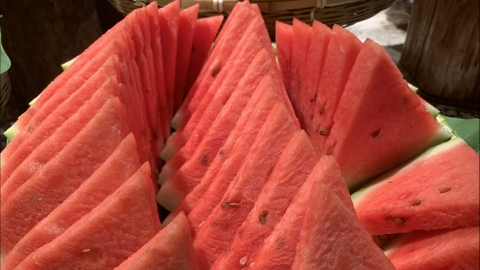Which Three Fruits Are Most Feared by People with Cold Body Constitution?
Generally speaking, there is no specific saying about "three fruits that cold-body individuals should fear the most." People with cold body constitution should avoid cold-natured fruits, including watermelon, pear, pomelo, dragon fruit, banana, and others. Cold-body individuals may experience worsened discomfort after consuming these fruits and should be cautious in their consumption. Detailed analysis is as follows:

1. Watermelon: Watermelon is cold in nature and sweet in taste, with a very high water content. Cold-body individuals may experience increased internal coldness after consumption, possibly leading to discomfort such as abdominal pain and diarrhea. Especially when consumed on an empty stomach or in large quantities, the stimulation to the gastrointestinal tract is more pronounced, which may also exacerbate symptoms like cold hands and feet.
2. Pear: Pears are cool in nature, sweet and slightly sour in taste. Although they have a lung-moistening effect, cold-body individuals may suffer damage to the spleen and stomach yang qi after consumption, leading to spleen and stomach cold deficiency, causing bloating and loose stools. Particularly when eaten raw, the cold nature is more likely to invade the body, which is not conducive to physical conditioning.
3. Pomelo: Pomelo is cold in nature, sweet and sour in taste, containing a significant amount of organic acids. After consumption, cold-body individuals may experience gastrointestinal irritation and impaired digestive function. The cold nature may also worsen symptoms such as chills and fatigue. Consumption should especially be reduced during autumn and winter seasons.
4. Dragon fruit: Dragon fruit is cool in nature and sweet in taste. Cold-body individuals may experience disrupted circulation of qi and blood after consumption, with possible worsening of dysmenorrhea in women during menstruation, more pronounced coldness in hands and feet, and gastrointestinal discomfort such as diarrhea.
5. Banana: Bananas are cold in nature and sweet in taste, often stored in refrigeration. After consumption by cold-body individuals, not only is coldness ingested, but its cool nature may also hinder the spleen and stomach's transformation and transportation functions, causing indigestion, bloating, and even exacerbating internal coldness, leading to symptoms such as fatigue and chills.
When choosing fruits in daily life, cold-body individuals should prioritize neutral or warm-natured varieties such as apples, cherries, and longan. Fruit consumption should avoid excess and preferably not be eaten on an empty stomach. Additionally, physical activity and drinking warm water can help improve cold-body constitution and reduce discomfort caused by improper diet.




